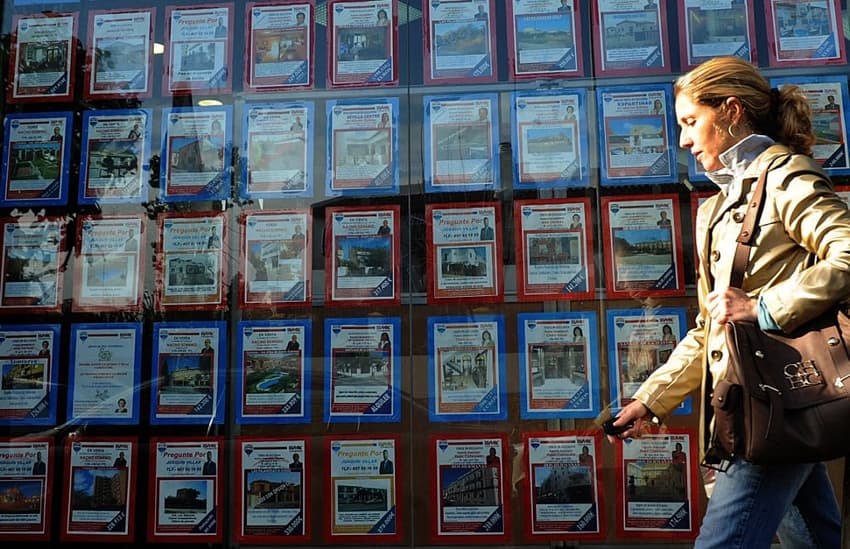Political party calls for ban on property sales to foreigners in Spain

A Valencian political party has requested that the national government temporarily ban foreigners from buying homes in Spain as a means of preventing property price rises and speculation.
Compromís has presented a potential amendment to Spain’s new Housing Law in the Senate where it proposes that the sale of homes to foreign individuals or companies be blocked for three years.
According to the left-wing Valencian coalition party, this would be in line with legislation implemented in Canada in January, which bans some foreigners from buying residential properties as investments for two years.
There are also some exceptions to Compromís’s proposed 36-month moratorium on the sale of properties to foreigners, these being foreigners who’ve had a work permit in Spain for at least three years, exiles or refugees, and citizens with temporary resident status valid for at least five months before.
Foreign companies focused on developing social housing in Spain would also be exempt.
For Compromís senator Carles Mulet, the main focus is to fight against so-called fondos buitre (vulture funds), hedge funds or private-equity funds that have bought up huge amounts of real estate in Spain and distorted the market. Blackstone is the most notorious, but there are hundreds more operating in the country.
It’s not the first time banning the sale of properties to foreigners has been suggested in Spanish political spheres as a means of addressing the country’s current housing crisis.
Last November, the Balearic government agreed to debate whether limiting the number of properties that can be bought by non-resident foreigners would benefit the archipelago.
Not long after, there were also calls in Spain’s Canary Islands to limit the purchase of properties by non-residents and foreigners.
From a legal perspective, the possibility of foreigners being banned from buying a home appears to go against the EU’s rules on the free movement of people and capital, applicable to non-EU citizens as well.
Therefore, any legislation rolled out in Spain would have to prove that foreign property purchases are explicitly blocking Spaniards from their fundamental right to housing.
The right to private property is also enshrined in the Spanish Constitution, further complicating the introduction of a legal amendment that most legal experts so far consider discriminatory.
Spain’s new Housing Law has been approved by the Spanish Parliament but now requires the final go-ahead in the Senate, where the last amendments are potentially added.
In the second half of 2022, foreign buyers represented 21.1 percent of the total number of property purchases in Spain, the highest figure on record.
Non-residents in particular splash out more than foreign residents living the country: €2,558/m on average, with Swiss, Swedish, Danish and American buyers being the biggest spenders.
Comments
See Also
Compromís has presented a potential amendment to Spain’s new Housing Law in the Senate where it proposes that the sale of homes to foreign individuals or companies be blocked for three years.
According to the left-wing Valencian coalition party, this would be in line with legislation implemented in Canada in January, which bans some foreigners from buying residential properties as investments for two years.
There are also some exceptions to Compromís’s proposed 36-month moratorium on the sale of properties to foreigners, these being foreigners who’ve had a work permit in Spain for at least three years, exiles or refugees, and citizens with temporary resident status valid for at least five months before.
Foreign companies focused on developing social housing in Spain would also be exempt.
For Compromís senator Carles Mulet, the main focus is to fight against so-called fondos buitre (vulture funds), hedge funds or private-equity funds that have bought up huge amounts of real estate in Spain and distorted the market. Blackstone is the most notorious, but there are hundreds more operating in the country.
It’s not the first time banning the sale of properties to foreigners has been suggested in Spanish political spheres as a means of addressing the country’s current housing crisis.
Last November, the Balearic government agreed to debate whether limiting the number of properties that can be bought by non-resident foreigners would benefit the archipelago.
Not long after, there were also calls in Spain’s Canary Islands to limit the purchase of properties by non-residents and foreigners.
From a legal perspective, the possibility of foreigners being banned from buying a home appears to go against the EU’s rules on the free movement of people and capital, applicable to non-EU citizens as well.
Therefore, any legislation rolled out in Spain would have to prove that foreign property purchases are explicitly blocking Spaniards from their fundamental right to housing.
The right to private property is also enshrined in the Spanish Constitution, further complicating the introduction of a legal amendment that most legal experts so far consider discriminatory.
Spain’s new Housing Law has been approved by the Spanish Parliament but now requires the final go-ahead in the Senate, where the last amendments are potentially added.
In the second half of 2022, foreign buyers represented 21.1 percent of the total number of property purchases in Spain, the highest figure on record.
Non-residents in particular splash out more than foreign residents living the country: €2,558/m on average, with Swiss, Swedish, Danish and American buyers being the biggest spenders.
Join the conversation in our comments section below. Share your own views and experience and if you have a question or suggestion for our journalists then email us at [email protected].
Please keep comments civil, constructive and on topic – and make sure to read our terms of use before getting involved.
Please log in here to leave a comment.